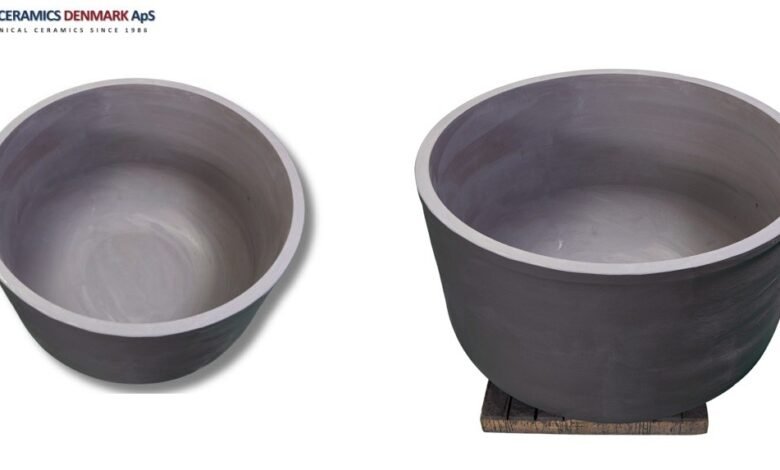Enhancing Foundry Efficiency with Advanced Ceramic Crucibles

Introduction: The Importance of Crucibles in Modern Foundries
In the world of metal casting, foundries are the heart of manufacturing operations. They produce critical components used in the automotive, aerospace, and industrial machinery sectors. At the center of these operations are crucibles, which are containers designed to hold and transfer molten metals safely and efficiently. The performance of these containers directly affects product quality, operational safety, energy efficiency, and overall productivity.
Traditional metal or graphite crucibles often face limitations under extreme heat. They can crack, warp, or react with molten metals, which can lead to contamination and wasted materials. The rise of advanced ceramic technology has offered a solution to these challenges. Modern crucibles are designed using materials like silicon nitride, sialon, and sintered silicon carbide, which provide high durability, thermal stability, and chemical resistance.
These innovations allow foundries to meet modern production standards while reducing downtime and maintenance costs. By investing in high-quality crucibles, foundries can improve safety, efficiency, and the overall quality of their metal products.
How Modern Crucibles Transform Foundry Operations
Foundries operate under extremely high temperatures, often exceeding 700°C. Crucibles must withstand repeated heating and cooling cycles, resist corrosion, and maintain their shape under heavy use.
Modern ceramic crucibles are engineered to meet these demands. Their excellent thermal conductivity ensures even heating of molten metals, reducing defects in cast products. Their chemical resistance prevents reactions with non-ferrous metals such as aluminium, copper, and zinc, protecting both the metal and the crucible itself.
Industries worldwide have recognized that investing in advanced crucibles is a cost-effective strategy. By reducing breakage, contamination, and energy waste, foundries can maintain productivity and achieve higher-quality outcomes. These crucibles also support a more predictable production schedule, allowing managers to plan operations with confidence and avoid unexpected downtime.
The Role of Material Quality in Foundry Crucibles
The material used in crucible manufacturing plays a key role in its performance. Advanced ceramics such as sintered silicon carbide and silicon nitride offer a unique combination of hardness, thermal stability, and chemical resistance.
One important property is thermal shock resistance. Foundry operations often require rapid heating and cooling, which can cause weaker materials to crack. Modern ceramic crucibles maintain structural integrity even under these challenging conditions. They are also resistant to wear and corrosion, ensuring a longer operational life and fewer replacements.
Sialon Ceramics ApS has been a trusted supplier of high-quality crucibles for over 38 years. The company specializes in Sialon, silicon nitride, and sintered silicon carbide components for the non-ferrous and chemical industries. Their crucibles are crafted for reliability, allowing foundries to operate efficiently while maintaining product quality. Sialon Ceramics ApS ensures that every product meets stringent quality standards and is designed to perform in demanding environments.
Applications of Foundry Crucibles in Industry
Foundry crucibles have a wide range of applications across industries. They are essential in any process where molten metals or high-temperature materials are handled.
- Melting and Holding Non-Ferrous Metals: Crucibles are used to melt metals like aluminium, copper, and zinc, ensuring consistent temperature control for casting.
- Alloy Production: They provide a controlled environment for mixing metals and producing high-quality alloys.
- Thermal Treatment: Crucibles maintain uniform heat for processes like hardening and annealing of metal components.
- Metal Pouring and Casting: High-strength crucibles reduce contamination and prevent spills during transfer to molds.
Using modern ceramic crucibles in these applications ensures thermal stability, resistance to wear, and minimal interaction with molten metals. This translates into higher quality products, better energy efficiency, and safer working conditions for foundry staff.
Advantages of Using Advanced Foundry Crucibles
Investing in ceramic crucibles offers clear operational and economic benefits. Some of the main advantages include:
- Exceptional Durability: Ceramic crucibles withstand high temperatures and repeated heating cycles without cracking or deforming.
- Resistance to Corrosion: Advanced materials resist reactions with non-ferrous metals, acids, and chemicals.
- Longer Lifespan: Reduced frequency of replacement lowers operating costs and saves time.
- Improved Product Quality: Even heating and chemical stability reduce contamination, leading to better castings.
- Energy Efficiency: Faster heating and consistent thermal performance save energy and reduce operational costs.
- Enhanced Safety: Durable materials minimize the risk of spills and accidents during metal handling.
Sialon Ceramics ApS, with nearly four decades of experience, manufactures custom-made foundry crucible and other technical ceramic components. Their products are engineered for reliability and sustainability, offering a combination of advanced material properties and precision craftsmanship that supports high-performance industrial operations worldwide.
Innovation Driving Foundry Crucible Performance
Modern foundries demand crucibles that are stronger, more durable, and easier to integrate into automated processes. Innovation in materials and design has transformed how these essential tools are manufactured and used.
Key trends in crucible innovation include:
- Using hybrid ceramic materials to combine toughness with thermal stability
- Employing 3D printing to produce precise custom shapes for specific applications
- Developing ceramic composites that reduce weight while maintaining strength
- Integrating sensors and digital monitoring to track temperature and wear in real-time
These innovations allow foundries to optimize productivity, reduce maintenance, and maintain consistent casting quality. Crucibles are no longer just containers; they are engineered components that play a critical role in the success and sustainability of modern foundry operations.
Why Sialon Ceramics ApS is a Trusted Partner
Choosing the right manufacturer ensures that foundries receive high-quality, reliable products. Working with a trusted provider like Sialon Ceramics ApS brings several advantages:
- Custom Solutions: Crucibles tailored to specific operational needs and industry standards.
- High-Quality Manufacturing: Every product is precision-engineered for consistent performance under extreme conditions.
- Quick Delivery: Stock products are ready for immediate use, and custom orders have a maximum lead time of four weeks.
- Sustainability: Focus on green manufacturing practices and eco-friendly ceramic technologies.
- Industry Expertise: Over 38 years of experience supplying non-ferrous and chemical industries.
Sialon Ceramics ApS produces foundry crucibles, Sialon ULTRA™ ceramics, and sintered silicon carbide components that are trusted by industries worldwide. Their combination of material expertise, innovation, and customer-focused service ensures that clients receive products that deliver operational efficiency, safety, and sustainability.
Sustainability and Efficiency in Foundry Operations
Foundries today face growing pressure to reduce waste, improve energy efficiency, and adopt environmentally responsible practices. Modern ceramic crucibles support these goals in multiple ways:
- Longer operational life reduces material waste.
- Efficient heat management lowers energy consumption.
- Minimal contamination reduces scrap and the need for rework.
- Compatibility with renewable energy systems improves environmental sustainability.
By incorporating advanced ceramic crucibles into their operations, foundries can achieve higher productivity while meeting global environmental standards. This combination of performance and sustainability ensures that modern foundry operations are efficient, safe, and environmentally responsible.
Challenges and How Ceramic Crucibles Overcome Them
Foundry operations are challenging environments, with extreme heat, molten metals, and repeated mechanical stresses. Common challenges include thermal shock, wear from metal contact, and contamination.
Modern ceramic crucibles, especially those made from sintered silicon carbide and silicon nitride, are engineered to overcome these challenges. Their heat resistance, chemical stability, and mechanical strength ensure consistent performance, allowing foundries to maintain high-quality output while reducing operational risks. These crucibles also minimize downtime, which improves overall production efficiency.
Conclusion: Driving Efficiency, Reliability, and Sustainability
Foundry crucibles are not just containers; they are critical tools that influence product quality, operational efficiency, and workplace safety. Advanced ceramics such as SiC and Sialon have transformed crucible performance, providing durability, chemical resistance, and thermal stability.
Sialon Ceramics ApS, with over 38 years of experience, leads the industry in producing high-performance foundry crucibles and technical ceramic components. Their products are engineered to meet demanding industrial requirements, combining reliability, sustainability, and innovation.
By choosing high-quality ceramic crucibles, modern foundries can achieve operational excellence, reduce waste, improve safety, and maintain a sustainable production process. Investing in advanced ceramic technology is no longer optional; it is essential for ensuring long-term efficiency, quality, and competitiveness in the foundry industry.






